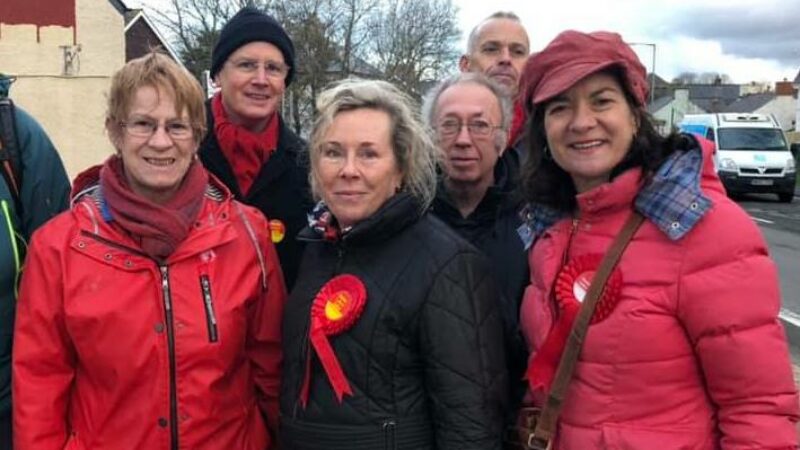
I’m standing outside a pub in the freezing cold as I wait for a train. After a few days of campaigning in Welsh marginals, I’m heading home. But before that, I get the chance to speak over the phone with Philippa Thompson, Labour’s candidate in Preseli Pembrokeshire.
“We’ve got away from Brexit – at least at the moment,” Philippa explains when I ask what the number one issue is on the doorstep. “People didn’t seem to have changed their mind necessarily, but they do seem quite open to the message of trying to bring our divided country back together.” Instead, they’re worried about the NHS and investment in the area, and about creating good, local jobs.
Philippa says: “If we talk to them them about the lack of money that comes from Westminster they think about that and can see that it would make a difference to have more investment.” She believes Labour has specific policies that have a lot to offer the people of Preseli and Pembrokeshire. In particular, Philippa talks about jobs.
She’s acutely aware that the area sees lots of young people leaving to find more attractive employment elsewhere: “Particularly since the energy industry, the oil industry has closed some of the refineries.” A recent poll showed that Labour’s commitment to a green industrial revolution is popular in the North of England and the Midlands. And from what Philippa says, the feedback on the doorstep would suggest the reception to such policies is much the same here.
She tells me people are “listening to the possibilities that we might be able to do something around the green industrial revolution – because Pembrokeshire has a great lot of tide, a lot of wind… We’ve got great natural resources but it’s really important that we can build jobs around those resources.”
But can politicians deliver what they promise? That seems to be the key question in Pembrokeshire – as in much of the rest of the country during this election campaign. Philippa tells me that a couple of people that same day had told her “politicians are always promising things but nobody every delivers”. But this doesn’t stop her. Philippa explains that through doorstep conversations, Labour can persuade them otherwise.
“We’ve got a really ambitious programme – a long term one rather than just a short term fix for a change. So it’s about explaining that some things may take time, but that there are some other things locally that we can do to make a start.”
Labour’s messaging on the NHS seems to be breaking through to people in the Welsh marginal as well. Not just in terms of her seat, but with Labour’s broader package for the health service nationally. Philippa explains that they’re “they’re worried about our local hospital – but actually they’re more worried about saving the NHS as a whole, and they’re interested in what Labour has to say”.
Brexit isn’t dominating the election in Preseli Pembrokeshire. This bodes well, given that the number of people who voted for UKIP in 2015 – nearly 5,000 – dwarfs the number of votes Philippa needs to make up in order to turn the seat red. The constituency is one of the most marginal in the country. Philippa stood for Labour in 2017 and reduced the Tory majority to just 314, but they’ve held the seat since 2005.
55% of local residents voted Leave in 2016. A resurgent Brexit vote could be damning for Labour here, and would most likely deliver the residents another Tory majority with more of the same to follow for Preseli Pembrokeshire: a lack of investment in their communities, and a dearth of jobs and opportunities. But Philippa is convinced that people are more concerned with other issues here. And Labour can give them something substantive – an ambitious programme with long term solutions – if only they vote for it next Thursday.




More from LabourList
Government announce SEND reform in schools white paper
SPONSORED: ‘Industrial hemp and the challenge of turning Labour’s priorities into practice’
‘A day is a long time in politics, so we need ‘action this day’’